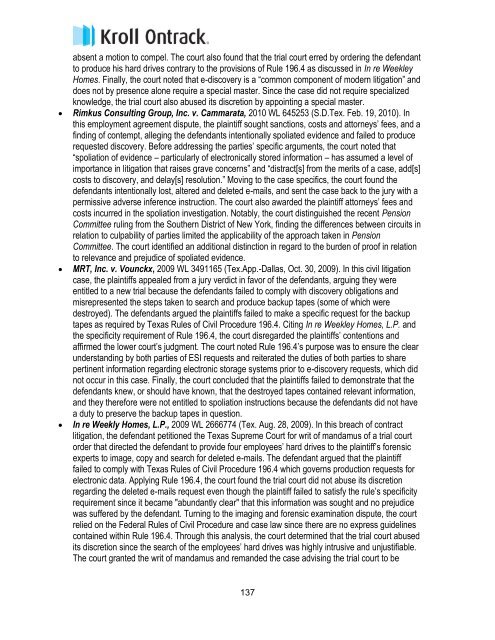Electronic Discovery and Computer Forensics Case List - Kroll Ontrack
Electronic Discovery and Computer Forensics Case List - Kroll Ontrack
Electronic Discovery and Computer Forensics Case List - Kroll Ontrack
You also want an ePaper? Increase the reach of your titles
YUMPU automatically turns print PDFs into web optimized ePapers that Google loves.
absent a motion to compel. The court also found that the trial court erred by ordering the defendant<br />
to produce his hard drives contrary to the provisions of Rule 196.4 as discussed in In re Weekley<br />
Homes. Finally, the court noted that e-discovery is a “common component of modern litigation” <strong>and</strong><br />
does not by presence alone require a special master. Since the case did not require specialized<br />
knowledge, the trial court also abused its discretion by appointing a special master.<br />
� Rimkus Consulting Group, Inc. v. Cammarata, 2010 WL 645253 (S.D.Tex. Feb. 19, 2010). In<br />
this employment agreement dispute, the plaintiff sought sanctions, costs <strong>and</strong> attorneys’ fees, <strong>and</strong> a<br />
finding of contempt, alleging the defendants intentionally spoliated evidence <strong>and</strong> failed to produce<br />
requested discovery. Before addressing the parties’ specific arguments, the court noted that<br />
“spoliation of evidence – particularly of electronically stored information – has assumed a level of<br />
importance in litigation that raises grave concerns” <strong>and</strong> “distract[s] from the merits of a case, add[s]<br />
costs to discovery, <strong>and</strong> delay[s] resolution.” Moving to the case specifics, the court found the<br />
defendants intentionally lost, altered <strong>and</strong> deleted e-mails, <strong>and</strong> sent the case back to the jury with a<br />
permissive adverse inference instruction. The court also awarded the plaintiff attorneys’ fees <strong>and</strong><br />
costs incurred in the spoliation investigation. Notably, the court distinguished the recent Pension<br />
Committee ruling from the Southern District of New York, finding the differences between circuits in<br />
relation to culpability of parties limited the applicability of the approach taken in Pension<br />
Committee. The court identified an additional distinction in regard to the burden of proof in relation<br />
to relevance <strong>and</strong> prejudice of spoliated evidence.<br />
� MRT, Inc. v. Vounckx, 2009 WL 3491165 (Tex.App.-Dallas, Oct. 30, 2009). In this civil litigation<br />
case, the plaintiffs appealed from a jury verdict in favor of the defendants, arguing they were<br />
entitled to a new trial because the defendants failed to comply with discovery obligations <strong>and</strong><br />
misrepresented the steps taken to search <strong>and</strong> produce backup tapes (some of which were<br />
destroyed). The defendants argued the plaintiffs failed to make a specific request for the backup<br />
tapes as required by Texas Rules of Civil Procedure 196.4. Citing In re Weekley Homes, L.P. <strong>and</strong><br />
the specificity requirement of Rule 196.4, the court disregarded the plaintiffs’ contentions <strong>and</strong><br />
affirmed the lower court’s judgment. The court noted Rule 196.4’s purpose was to ensure the clear<br />
underst<strong>and</strong>ing by both parties of ESI requests <strong>and</strong> reiterated the duties of both parties to share<br />
pertinent information regarding electronic storage systems prior to e-discovery requests, which did<br />
not occur in this case. Finally, the court concluded that the plaintiffs failed to demonstrate that the<br />
defendants knew, or should have known, that the destroyed tapes contained relevant information,<br />
<strong>and</strong> they therefore were not entitled to spoliation instructions because the defendants did not have<br />
a duty to preserve the backup tapes in question.<br />
� In re Weekly Homes, L.P., 2009 WL 2666774 (Tex. Aug. 28, 2009). In this breach of contract<br />
litigation, the defendant petitioned the Texas Supreme Court for writ of m<strong>and</strong>amus of a trial court<br />
order that directed the defendant to provide four employees’ hard drives to the plaintiff’s forensic<br />
experts to image, copy <strong>and</strong> search for deleted e-mails. The defendant argued that the plaintiff<br />
failed to comply with Texas Rules of Civil Procedure 196.4 which governs production requests for<br />
electronic data. Applying Rule 196.4, the court found the trial court did not abuse its discretion<br />
regarding the deleted e-mails request even though the plaintiff failed to satisfy the rule’s specificity<br />
requirement since it became "abundantly clear" that this information was sought <strong>and</strong> no prejudice<br />
was suffered by the defendant. Turning to the imaging <strong>and</strong> forensic examination dispute, the court<br />
relied on the Federal Rules of Civil Procedure <strong>and</strong> case law since there are no express guidelines<br />
contained within Rule 196.4. Through this analysis, the court determined that the trial court abused<br />
its discretion since the search of the employees’ hard drives was highly intrusive <strong>and</strong> unjustifiable.<br />
The court granted the writ of m<strong>and</strong>amus <strong>and</strong> rem<strong>and</strong>ed the case advising the trial court to be<br />
137

















